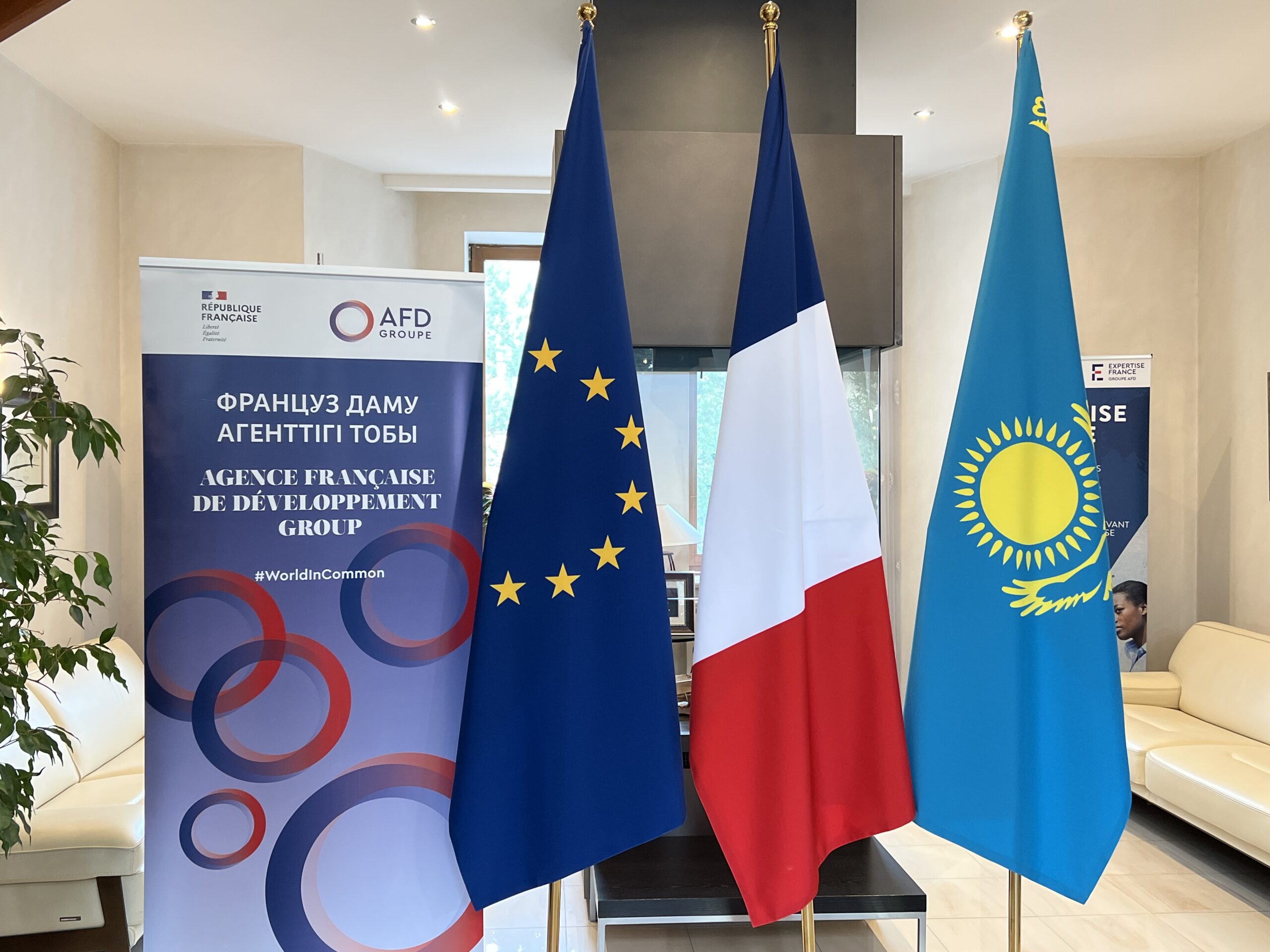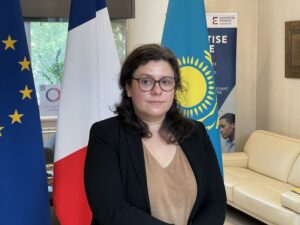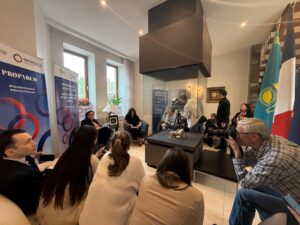ASTANA — The cooperation between France and Kazakhstan is entering a new phase of dynamic development, said Amélie Aubert, a regional director for Central and East Asia at the French Development Agency (AFD), during a press conference at the French ambassador’s residence in Astana on April 11.

AFD in Kazakhstan. Photo credit: Nagima Abuova / The Astana Times
“In the past year, we have seen a growing dynamic regarding the development of the cooperation between France and Kazakhstan. It is materialized by the opening of the French Development Agency here in Astana, with the objective to develop a long-standing project and partnership with the authorities here in Kazakhstan,” said Aubert.
Following the memorandum of understanding signed in November 2024 during President Kassym-Jomart Tokayev’s state visit to France, AFD began operating in Kazakhstan with an agenda focused on healthcare, water resource management, energy transition, and inclusive growth.
“The French Development Agency has been working with different stakeholders here in Kazakhstan. We have recently signed and started to operationalize a first project dedicated to support the Ministry of Health and healthcare strategy, particularly regarding investment in infrastructure in the health sector,” she said.
Agency structure and global reach

Amélie Aubert, a regional director for Central and East Asia at the French Development Agency (AFD). Photo credit: Nagima Abuova / The Astana Times
AFD operates under the supervision of France’s Ministry for Europe and Foreign Affairs and the Ministry of the Economy and Finance. It consists of three complementary entities: the AFD itself, which finances development for public bodies; Proparco, focused on private sector support; and Expertise France, a technical cooperation agency integrated into the group in 2022.
“Of course, our activities in different countries and regions vary. Either we work in developing countries, such as in Africa, or in countries with intermediate economies,” said Aubert.
“Our activities are focused on three goals. The first goal is to reduce inequality. The second goal is sustainable development. The third goal is to ensure access to digital equality and development,” she added.
The group operates in more than 115 countries with over 12 billion euro (US$13.6 billion) allocated annually through loans, grants, guarantees and technical assistance.
Healthcare infrastructure and public-private partnerships
AFD has granted 945,000 euro (US$1.07 million) to the Kazakh Ministry of Health and its partners, including Turar Healthcare and the Salidat Kairbekova Research Center, to support the national healthcare infrastructure development plan through 2030. Expertise France will implement the two-year technical assistance project to strengthen institutional capacity, investment strategy, and hospital operations.
Additionally, Proparco has allocated 90 million euro (US$102 million) to co-finance the construction of a 630-bed hospital in Kokshetau, the capital of the Akmola region, under a public-private partnership with Kazakh stakeholders and Turkish company Rönesans.
Sustainable water management and regional cooperation
Water remains a key priority in AFD’s portfolio in Kazakhstan. The agency is financing the development of a sustainable water management master plan for the Balkhash Lake basin, backed by 1.35 million euro (US$1.53 million). The plan will integrate resource forecasts, environmental considerations, and livelihood protections for affected populations.

Amélie Aubert, a regional director for Central and East Asia at the French Development Agency (AFD). Photo credit: Nagima Abuova / The Astana Times
On a regional level, Aubert highlighted the AFD’s project to support the International Fund for Saving the Aral Sea (IFSA) through a two million euro (US$2.27 million) grant. The grant will assist IFSA in analyzing water needs for experimental subaquatic basins in the Aral Sea, Kazakhstan, and Uzbekistan. The project will also map agricultural water needs and raise awareness on sustainable water use among youth.
“We know that all international actors are trying to support IFAS and the actors involved in the protection of the Aral Sea. Unfortunately, the context at the moment, as you know, is not favorable, but I hope that the mobilization of all partners will help stabilize the situation,” said Aubert when asked whether it is possible to save the Aral Sea.
“This is an ambitious question,” she said.
Climate action and energy transition
Aubert highlighted Kazakhstan’s significant potential in the global energy transition, citing its critical raw materials and strategic vision.
“I’m pretty convinced that Kazakhstan has a major role to play. Internally, with an ambition to transition the country toward a greener strategy of investment. But beyond that, Kazakhstan, given the resources it has regarding critical raw materials, is also a key actor. These resources are instrumental in supporting the industries of the transition — both in energy and, more generally, around climate issues,” she said.
AFD also intends to support Kazakhstan’s just energy transition through Facility 2050, a financing tool designed to facilitate decarbonization while addressing potential socioeconomic impacts.
Digital connectivity, transport and future financing initiatives
AFD and Expertise France are also developing a new set of large-scale initiatives aligned with Kazakhstan’s long-term development goals and European Union strategies.
In March, Jérémie Pellet, Director General of Expertise France, visited Tashkent and Astana to launch a new EU-funded initiative focused on enhancing satellite-based digital connectivity in Central Asia. This flagship project falls under the European Union’s Global Gateway strategy and is led by Expertise France within a consortium of European partners.
The project spans all five Central Asian countries — Kazakhstan, Tajikistan, the Kyrgyz Republic, Turkmenistan, and Uzbekistan — and aims to bridge the region’s digital divide by expanding satellite internet access. A second component, overseen by the European Investment Bank, will test low-orbit satellite deployment to enhance infrastructure further and ensure equitable internet coverage.
Additionally, in collaboration with AFD and German development agency GIZ, Expertise France aims to establish a consortium to implement part of the EU Action Document under the Global Gateway program for the development of the Trans-Caspian International Transport Route (TITR), also known as the Middle Corridor. This EU-funded project, worth 30 million euro (US$34 million), is expected to launch in 2026 and run for four years.
“AFD itself does not intend, in the short term, to intervene with loans or financing dedicated to Kazakhstan’s railway sector. What we will likely do, through Expertise France, is mobilize technical assistance and expertise to support the institutional framework of this program—possibly contributing to its implementation and conducting feasibility studies for specific investments,” said Aubert.


